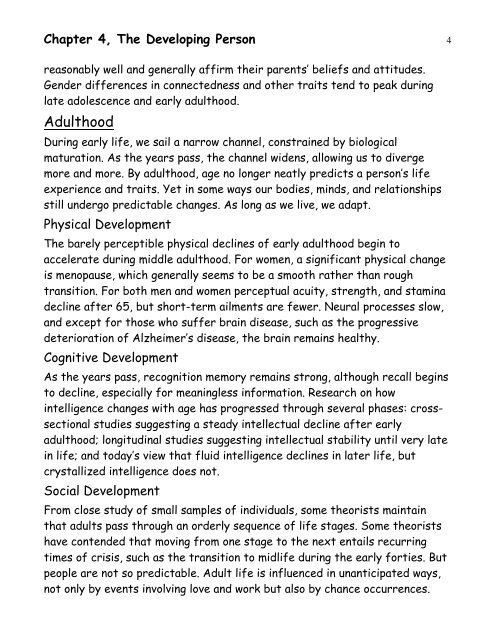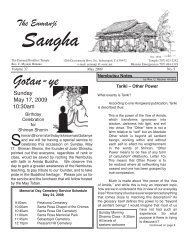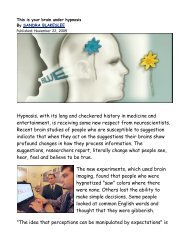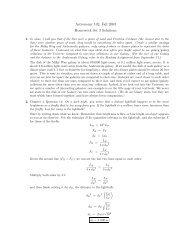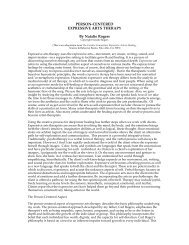Physical Development in Infancy and Childhood - Sonic.net
Physical Development in Infancy and Childhood - Sonic.net
Physical Development in Infancy and Childhood - Sonic.net
Create successful ePaper yourself
Turn your PDF publications into a flip-book with our unique Google optimized e-Paper software.
Chapter 4, The Develop<strong>in</strong>g Person 4<br />
reasonably well <strong>and</strong> generally affirm their parents’ beliefs <strong>and</strong> attitudes.<br />
Gender differences <strong>in</strong> connectedness <strong>and</strong> other traits tend to peak dur<strong>in</strong>g<br />
late adolescence <strong>and</strong> early adulthood.<br />
Adulthood<br />
Dur<strong>in</strong>g early life, we sail a narrow channel, constra<strong>in</strong>ed by biological<br />
maturation. As the years pass, the channel widens, allow<strong>in</strong>g us to diverge<br />
more <strong>and</strong> more. By adulthood, age no longer neatly predicts a person’s life<br />
experience <strong>and</strong> traits. Yet <strong>in</strong> some ways our bodies, m<strong>in</strong>ds, <strong>and</strong> relationships<br />
still undergo predictable changes. As long as we live, we adapt.<br />
<strong>Physical</strong> <strong>Development</strong><br />
The barely perceptible physical decl<strong>in</strong>es of early adulthood beg<strong>in</strong> to<br />
accelerate dur<strong>in</strong>g middle adulthood. For women, a significant physical change<br />
is menopause, which generally seems to be a smooth rather than rough<br />
transition. For both men <strong>and</strong> women perceptual acuity, strength, <strong>and</strong> stam<strong>in</strong>a<br />
decl<strong>in</strong>e after 65, but short-term ailments are fewer. Neural processes slow,<br />
<strong>and</strong> except for those who suffer bra<strong>in</strong> disease, such as the progressive<br />
deterioration of Alzheimer’s disease, the bra<strong>in</strong> rema<strong>in</strong>s healthy.<br />
Cognitive <strong>Development</strong><br />
As the years pass, recognition memory rema<strong>in</strong>s strong, although recall beg<strong>in</strong>s<br />
to decl<strong>in</strong>e, especially for mean<strong>in</strong>gless <strong>in</strong>formation. Research on how<br />
<strong>in</strong>telligence changes with age has progressed through several phases: crosssectional<br />
studies suggest<strong>in</strong>g a steady <strong>in</strong>tellectual decl<strong>in</strong>e after early<br />
adulthood; longitud<strong>in</strong>al studies suggest<strong>in</strong>g <strong>in</strong>tellectual stability until very late<br />
<strong>in</strong> life; <strong>and</strong> today’s view that fluid <strong>in</strong>telligence decl<strong>in</strong>es <strong>in</strong> later life, but<br />
crystallized <strong>in</strong>telligence does not.<br />
Social <strong>Development</strong><br />
From close study of small samples of <strong>in</strong>dividuals, some theorists ma<strong>in</strong>ta<strong>in</strong><br />
that adults pass through an orderly sequence of life stages. Some theorists<br />
have contended that mov<strong>in</strong>g from one stage to the next entails recurr<strong>in</strong>g<br />
times of crisis, such as the transition to midlife dur<strong>in</strong>g the early forties. But<br />
people are not so predictable. Adult life is <strong>in</strong>fluenced <strong>in</strong> unanticipated ways,<br />
not only by events <strong>in</strong>volv<strong>in</strong>g love <strong>and</strong> work but also by chance occurrences.


